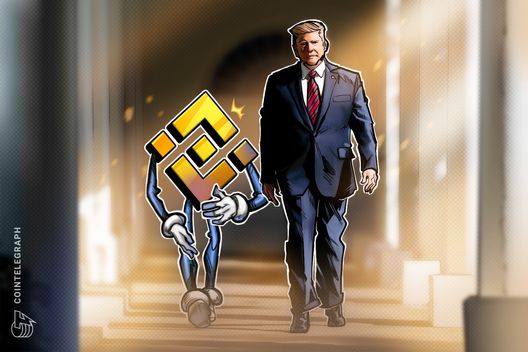
Binance CEO Richard Teng Firmly Denies Pushing Trump-Linked Stablecoin for Major Investment

In the often-turbulent world of cryptocurrency, allegations of undue influence and backroom dealings are not uncommon. The latest to draw significant attention involves Binance, the world's largest cryptocurrency exchange, and a stablecoin reportedly linked to former U.S. President Donald Trump. However, Binance CEO Richard Teng has moved swiftly to address these claims, unequivocally stating that the company had no involvement in a crucial decision regarding a substantial $2 billion investment.
A Billion-Dollar Allegation Unpacked
The core of a recent report suggested that an Abu Dhabi-based company opted to use World Liberty Financial's USD1 stablecoin as the vehicle for its massive $2 billion investment into Binance. The implication, which quickly sparked speculation across financial news outlets and crypto communities, was that Binance itself might have pushed or influenced this specific choice. World Liberty Financial's USD1 has garnered attention for its reported ties to Donald Trump, making any alleged involvement from a major exchange like Binance politically sensitive and subject to intense scrutiny.
The stablecoin market is a critical component of the broader crypto ecosystem, acting as a vital bridge between volatile digital assets and traditional fiat currencies. The selection of one stablecoin over others for a transaction of this magnitude is far from trivial, especially when the chosen asset carries a high-profile, non-financial association that could invite controversy or additional oversight.
Richard Teng's Unequivocal Denial
Addressing the swirling rumors head-on, Binance CEO Richard Teng issued a clear and concise denial. According to reports, Teng explicitly stated that Binance "didn't partake" in the decision for the Abu Dhabi-based company to utilize World Liberty Financial's USD1. This statement serves to firmly distance Binance from any perceived endorsement or pressure concerning the stablecoin's use in the investment deal.
Teng's remarks emphatically underscore Binance's operational independence and its commitment to allowing investing parties to make their own financial decisions without interference. For a company under constant global regulatory watch and aiming to foster trust in the digital asset space, maintaining such a neutral stance is absolutely crucial. Any suggestion of steering investors towards a particular asset, especially one with political affiliations, could raise significant red flags regarding market neutrality, fairness, and regulatory compliance.
The USD1 Stablecoin: Context and Implications
World Liberty Financial's USD1 stablecoin has been a point of considerable interest, primarily due to its association with figures connected to Donald Trump. While the specific nature of this connection can be nuanced and subject to various interpretations, its public perception often links it to the former president's business ventures or political movements. Stablecoins, by their very definition, are designed to maintain a stable value, usually pegged to a fiat currency like the U.S. dollar, thereby facilitating transactions and providing a relatively stable asset during periods of market volatility.
The choice of USD1 for a multi-billion dollar investment raises legitimate questions about its liquidity, its regulatory standing in different jurisdictions, and its general acceptance within the institutional crypto space – particularly when more established and widely adopted stablecoins like USDT (Tether) or USDC (USD Coin) are readily available and extensively used for large-scale transactions. Teng's denial, therefore, not only addresses Binance's non-involvement but also subtly reinforces that such significant financial decisions rest solely with the independent investor.
Significance of the Abu Dhabi Investment
The $2 billion investment into Binance from an Abu Dhabi-based company is, in itself, a momentous event within the cryptocurrency landscape, irrespective of the stablecoin used. It signals robust institutional confidence in Binance's future trajectory and the broader cryptocurrency market, particularly emanating from a region that is increasingly positioning itself as a global hub for digital finance innovation. Such large-scale investments are vital for the sustained growth and expansion of major crypto exchanges, enabling them to enhance infrastructure, develop new products, and deepen their market penetration globally.
Against this backdrop, the allegations concerning USD1 threatened to overshadow the otherwise positive implications of this substantial investment. Richard Teng's swift and decisive response aims to clarify the situation, ensuring that the focus remains squarely on Binance's strategic growth and its ongoing efforts to build a robust, secure, and compliant platform for its millions of users worldwide.
Navigating Trust and Transparency in the Crypto Sphere
This incident vividly highlights the constant and pressing need for transparency and crystal-clear communication within the cryptocurrency sector. As crypto assets continue to gain mainstream adoption and attract ever-larger sums of institutional capital, the scrutiny from regulators, traditional media outlets, and the general public naturally intensifies. For a global industry leader like Binance, effectively managing its reputation and ensuring that its operations are consistently perceived as fair, neutral, and compliant is paramount for its long-term success and credibility.
Richard Teng's firm denial is a strategic and necessary move to safeguard Binance's integrity and reinforce its unwavering commitment to fostering a transparent and unbiased marketplace. It sends a clear message that while Binance facilitates vast sums of capital flow, the ultimate decisions regarding specific assets and investment vehicles lie with the independent parties involved, operating free from any undue influence or pressure from the exchange itself. This dedication to independence and transparency is vital for cultivating trust in an evolving and often complex financial ecosystem.
Keywords: Crypto
